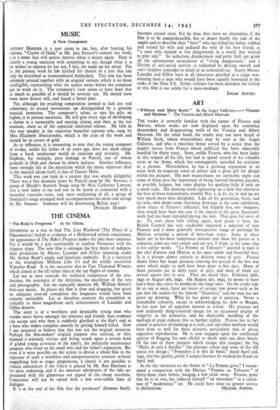THE CINEMA
The Rake's Progress." At the Odeon.
DIVERTING as it was to find The Lost Weekend (The Diary of a Dipsomaniac) hailed as evidence of a Hollywood artistic renaissance, the appearance of The Rake's Progress makes the joke more ominous. For it would be a pity consistently to confuse Parnassus with the slippery slope. The new film is amongst the first fruits of indepen- dent production by Messrs. Launder and Gilliat operating under Mr. Arthur Rink's ample and luxurious umbrella. It is a successor to the triumphant Millions Like Us and the solidly successful Waterloo Road. It -is the successor also to Two Thousand Women, which aimed at the till rather than at the top flights of cinema.
Let me at once concede the technical competence of the pro- duction, the assurance of the direction, the excellence of the sets and photography. Let me especially mention Mr. William Alwyn's first-rate music. In places the film is slow and dragging, but given an adequate over-all conception the longueurs would have been scarcely noticeable. Let us therefore examine the conception as critically as those magnificent early achievements of Launder and Gilliat deserve.
The story is of a worthless and despicable young man who wreaks more havoc amongst his relations and friends than credence can accept and who then is suddenly glorified at the film's end as a hero who makes complete amends by getting himself killed. Now I am prepared to believe that this was not the original intention. Perhaps the film-makers' original purpose was satirical, or they planned a solemnly vicious and biting attack upon a certain kind of gilded young aristocrat of the 1930's, the politically unconscious gangster who lived on his small wits and his father's reputation. But even if it were possible on the screen to devote a whole film to the exposure of such a worthless and unrepresentative creature without magnifying him to tragic proportions, it clearly is not possible to remain admonitory if the villain is played by Mr. Rex Harrison at his most endearing, and if the amorous adventures of the rake are presented with the glamorous sex appeal of the cheap novelette. Conscience will not be salved with a few over-subtle lines of dialogue. It is at the end of the film that the producers' dilemma finally
becomes crystal clear. For by then they have no alternative, if the film is to be comprehensible, but to desert finally the side of the angels-and to describe- their " hero " who has killed his father, robbed and ruined his wife and seduced the wife of his best friend, as " a man who wanted to live dangerously in a world that wanted to play safe." So seduction, drunkenness and petty theft are given all the adventurous associations of " living dangerously," and a lifetime of anti-social activity is redeemed by driving oneself and one's helpless comrades to death in an armoured car. Surely Messrs. Launder and Gilliat have in all innocence glorified as a tragic war- winning hero a man who would have been equally honoured in the ranks of the Nazi S.S. Either violence has been mistaken for virility or this film is too subtle for a mass-medium.
EDGAR ANSTEY.


























 Previous page
Previous page